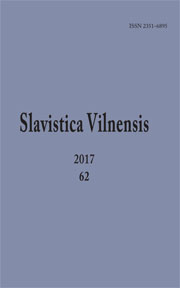Псковские говоры в их синхронно-диахронных отношениях с соседними языками (к фиксации и исследованию)
The Synchronic and Diachronic Relation of the Pskov Dialect to its Neighboring Languages (regarding Reporting and Research)
Author(s): Larisa KostyuchukSubject(s): Theoretical Linguistics, Lexis, Comparative Linguistics, Finno-Ugrian studies, Eastern Slavic Languages, Baltic Languages, Philology
Published by: Vilniaus Universiteto Leidykla
Keywords: Pskov dialect; Pskov Regional Dictionary with Historical Data; multilevel dialect peculiarities; lack of the second palatalisation; lack of consonant blends reduction; borderzone with Baltic;
Summary/Abstract: The collection and research of the Pskov folk speech have resulted in an understanding of the role of synchronic and diachronic relations of the Pskov dialect to its neighboring languages in the borderzone. Certain unique peculiarities of the Pskov dialect distinguish it from the East Slavic languages and all Russian dialects. The multi-faceted lexicographic work on the Pskov Regional Dictionary with Historical Data compels us to search for the explanation of specific dialectic aspects of certain words (кеп, всегли, мочигло, подпояхаться, приведи булку, etc.) and to find investigational solutions that change established academic judgments. Archaeological data are relevant for the study of the Pskovian ancestors’ contacts with the native speakers of other linguistic systems (Baltic and Finno-Ugrian in the first place). The 20th century has demonstrated that records of the folk speech throughout all stages of preservation must be accurate, as the consideration of even rare facts may lay the foundation of an important discovery and new theoretical conclusions.
Journal: Slavistica Vilnensis
- Issue Year: 62/2017
- Issue No: -
- Page Range: 117-138
- Page Count: 22
- Language: Russian

